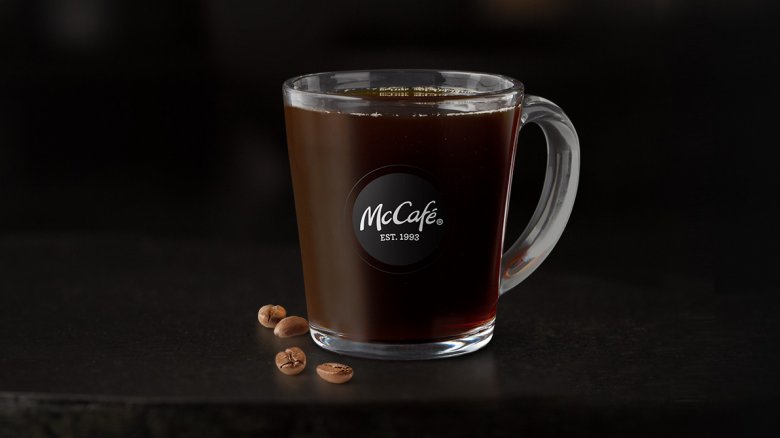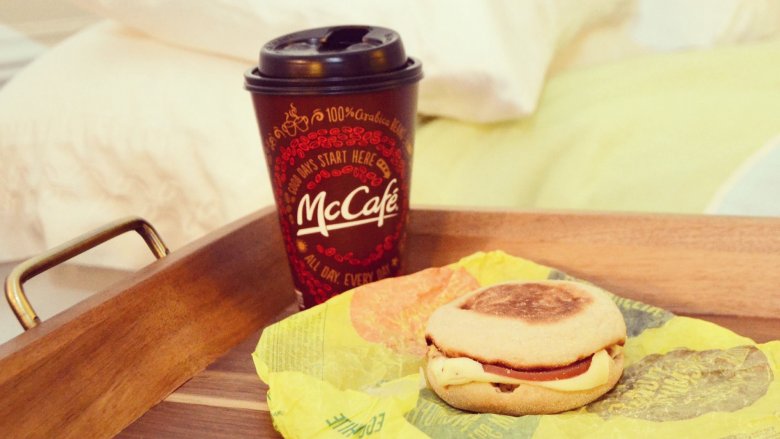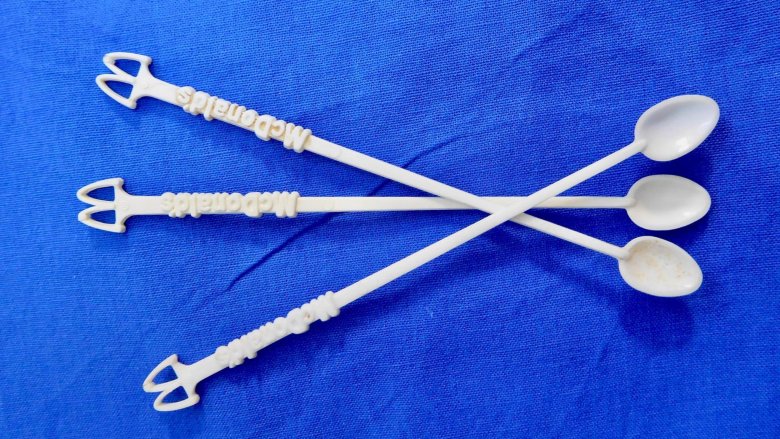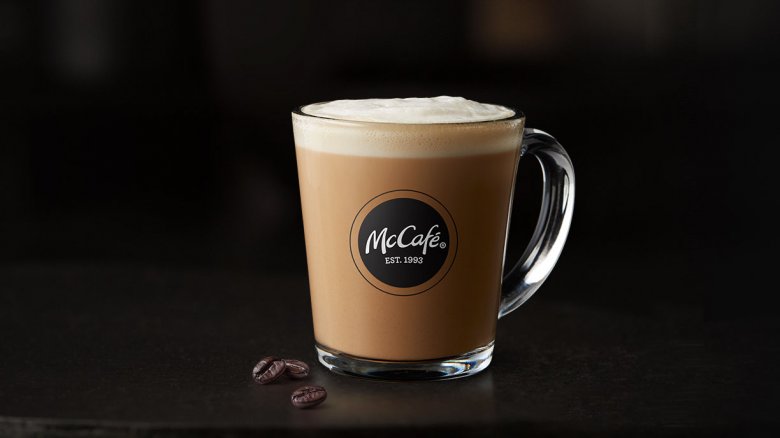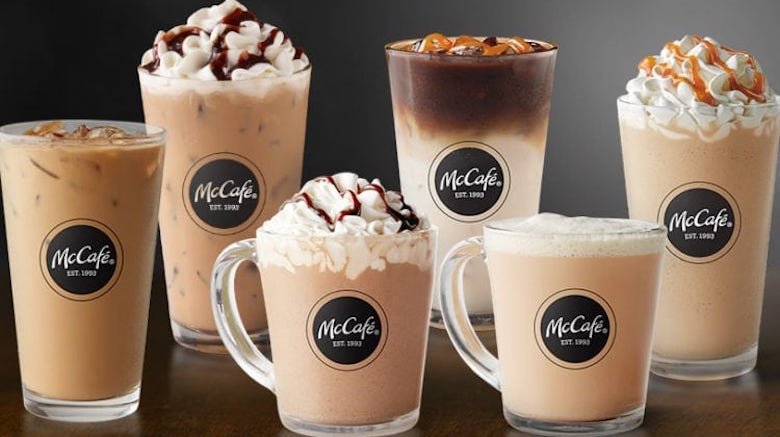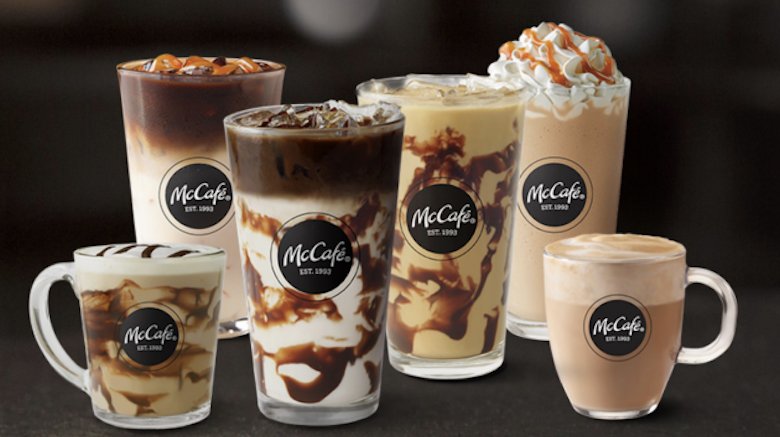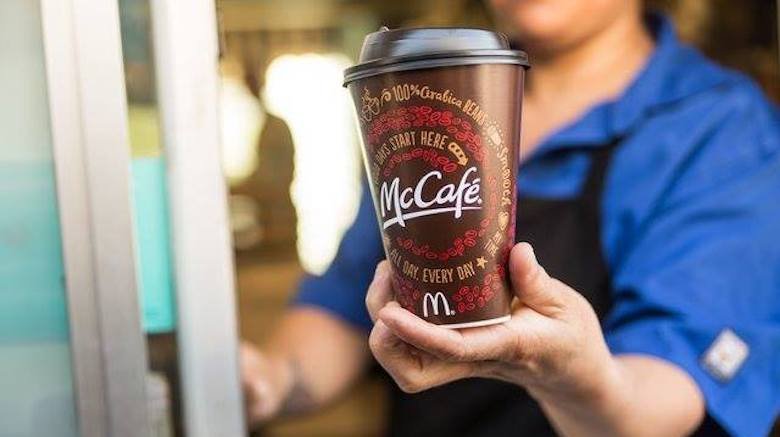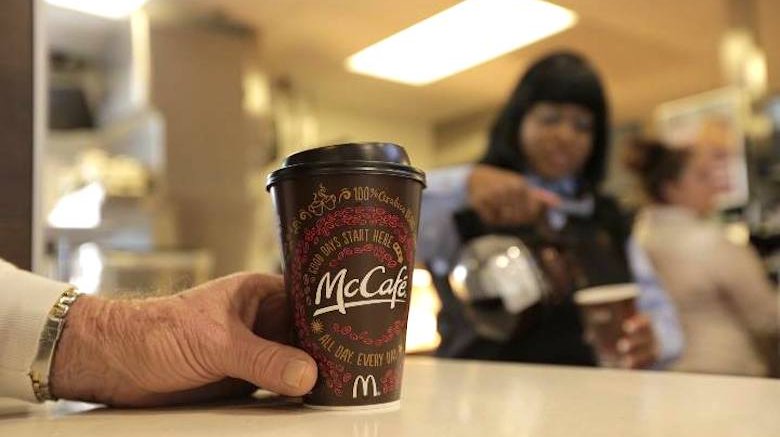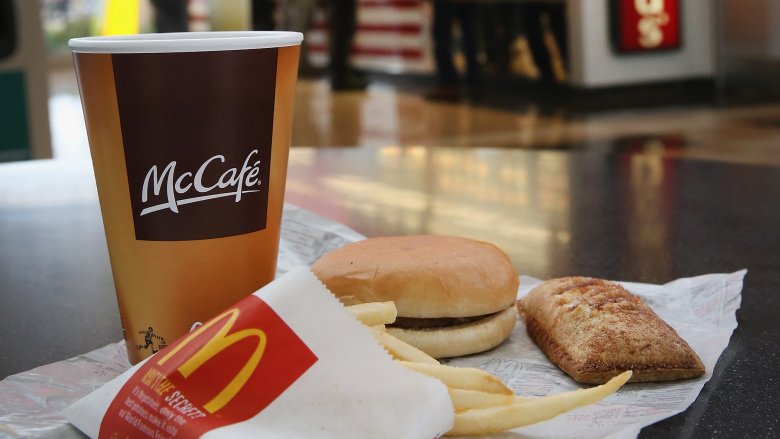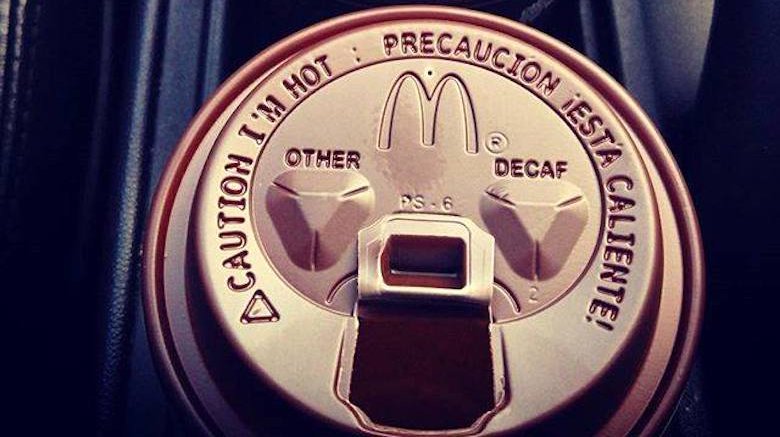Things You Didn't Know About McDonald's Coffee
We may receive a commission on purchases made from links.
Coffee has been on the McDonald's menu since the restaurant's inception, and when a fast food giant has been slinging something for more than half a century, there's bound to be some fun facts, interesting history, and maybe even some scintillating gossip to be learned. Nobody can forget that infamous lawsuit, can they?
Once upon a time, a plain ol' cup of joe at the Mickey D's would run you 10 cents, and we can only assume it was something super tasty, like Maxwell House, that had been brewed many hours before. These days, you can often nab a McCafe coffee, made with 100 percent Arabica beans and freshly brewed every 30 minutes, for just a buck (depending on the current promotion). Not too bad of an inflation rate for 70-some years, eh? But while cheap is a fine attribute, what about its taste? Believe it or not, plenty of coffee lovers out there adore the drinks in the McDonald's McCafe lineup, and some even think they're better than Starbucks. Gasp. And the numbers don't lie — the McCafe brand is responsible for making the Golden Arches a shocking amount of money each year. How much? You'll have to read on to find out, along with all the other things you never knew about McDonald's coffee.
The McCafe machines might be disgusting
Bad news, McCafe fans: There might be a secret ingredient in those coffee drinks you love so much, but it's not a pinch of cinnamon or a dash of vanilla — according to one Mickey D's employee on Reddit, it's much more nauseating than that.
"I work for McDonald's and make sure everyone that matters to me never orders anything that comes out of the McCafe machine as these are routinely neglected, in practically all the McDonalds," they said. Not only are staff not properly trained in its cleaning and maintenance, at almost every McDonalds I've had experience with, the managers in charge of training them don't know [anything] either." They went on to explain in detail how disgusting the insides of the machines are, including the lines, before concluding, "TL;DR: All McCafe beverages run through a horrifically dirty machine – we're talking 5+ inches of uncleaned, liquid bulls*** making up its inside parts..."
When another Redditor refuted this allegation saying that their location has a cleaning kit, complete with brushes, that gets used every night, a third employee chimed in to put the final nail in the coffin, saying they hadn't used the brushes in about six months... "so its insides are completely untouched..."
In other words, one in three locations might have a properly cleaned McCafe machine. Do with that information what you will.
There's a reason they use stir sticks instead of spoons
Once upon a time, McDonald's provided the cutest little spoons you ever did see to customers who wanted to stir cream and sugar into their coffee. No plain ol' wooden sticks or skinny straws here — these tiny plastic spoons even came topped with a miniature version of the iconic Golden Arches symbol. But this was in the '70s, and coffee wasn't the only stimulant in town. When the tiny plastic spoons got a reputation for doing more than stirring coffee, McDonald's had to make an executive decision.
See, when your company's coffee stirrers become the drug user's paraphernalia of choice to snort cocaine, it's probably not the best look. And it's probably even worse when that dose of cocaine, packaged with a Golden Arches stirrer, gets dubbed a "McSpoon." That's a reason for a redesign if we ever heard one. According to Snopes, a spokesman for McDonald's said, "It has been brought to our attention that people are using them illegally and illicitly for purposes for which they are not intended," and eventually, the tiny spoon got replaced with a flat paddle — you know, one that couldn't be used so easily to snort things.
It might be full of chemicals
There's probably nothing you could tell a coffee addict to make them give up their beloved, caffeine-laced manna of the gods. Sure, we know that it contains a chemical proven to cause cancer in rats, but no matter, they'd say — it hasn't officially been shown to cause cancer in humans, has it? And even if it did, you'd likely still have to pry that cup of joe from their hands.
But even the most devout coffee lover would have to spit out a latte full of cleaning solution, right? That's what one pregnant McDonald's customer did when she was served a McCafe drink spiked with "coffee systems cleaning solution."
"I had no idea what I was drinking," Sarah Douglas told Global News. "I just knew it wasn't coffee and it tasted like chemical." The incident took place in 2018 at an Alberta, Canada location, and while it wasn't done out of malice, it's still a concerning occurrence because according to the franchise owner, it seems to be a matter of carelessness. "What happened is that the machine was being cleaned — as it is every morning," Dan Brown said. "Unfortunately, the milk supply line was connected to the cleaning solution while this guest's drink was made."
On the plus side, at least the milk supply line was being cleaned?
They're trying to compete with Starbucks
McDonald's introduction of the McCafe line of bougie coffee drinks in 2009 was a strategic move against a big competitor: Starbucks. The fancified espresso offerings were said to be a "game-changer at the time," and CBS News reported that a Deutsche Bank analyst downgraded Starbucks stock to "sell," and wrote in a memo to clients, "We expect McDonald's will extract a significant toll on Starbucks' performance, beginning this summer in earnest."
The company known for its Big Macs and Egg McMuffins reports that 16 percent of its sales per year, or $4 billion annually (as of 2016), are generated from the McCafe line, and while that sounds like a whole lot of money, it pales in comparison to Starbucks' 2018 estimated revenue of almost $25 billion. But experts still say that Mickey D's offerings should worry the coffee chain powerhouse, due to their significantly lower prices (with some drinks coming in about half the price) and the fact that the fast food chain continues to roll out new flavors and options similar to Starbucks.
There's no way to know if Starbucks is truly worried about losing business from the Golden Arches, but if we were their competitors, half priced coffee plus the promise of a piping hot hash brown would worry us.
McCafe drinks are not a franchisee favorite
You'd think that if McCafe drinks are pulling in $4 billion annually, franchise owners would be singing the line's praises. That's not the case though, and the reason actually makes perfect sense when you consider that McDonald's is in the "fast" food business.
We've all been stuck in that Starbucks line that moves at a snail's pace, and it's definitely annoying. But hey, we're all there for the same reason, and your specialized latte with 13 modifications is going to slow things down just like the ridiculous orders in front of and behind you. At McDonald's though, a lot of customers are just trying to get their Egg McMuffin and not be late to work, and the McCafe drinks can make that impossible, franchisees say.
In surveys asking what menu items should be cut, the espresso-based McCafe drinks got several mentions, and Business Insider reports that owners complained that the espresso-based drinks lead to "slow ordering time, slow make time, and therefore slow service time," explaining that "time-consuming products like this do not belong on McDonald's menu." And don't forget — the McDonald's employees aren't trained baristas... they're managing your McGriddles and your hash browns, too. One franchise owner lamented that getting the drinks correct was a challenge, saying "there are too many ways to mess them up."
Maybe next time, if there's a long line behind you, do everyone a solid and just order a regular cup of coffee.
It can get you charged with assault
Drive-thru workers have to deal with their fair share of complaints from unhappy customers, but from time to time an unhappy customer ratchets things up a few notches, and suddenly the cup of hot coffee they were just handed becomes a deadly (or potentially dangerous, anyway) weapon.
In 2019, 54-year-old Joseph DeLuca was indicted on two counts of second-degree felonious assault after he threw scalding hot McDonald's coffee at the drive-thru worker manning the window. DeLuca was erroneously given two cups of coffee instead of one, and when he was asked to show his receipt to confirm the purchase, he became enraged. He then whipped the entire tray, with both cups of coffee, back at the employee, who suffered first-degree burns on her neck, shoulder, and face — and of course, because it's 2019, the entire incident was caught on video. DeLuca faces up to 16 years in prison if charged with both counts.
Not all coffee is created equal
Think that coffee is coffee is coffee? Spoiler alert: It's not. And we're not just talking about taste here, either. It turns out the the amount of caffeine in your cup varies wildly, depending on where you get it. Curious about how Mickey D's stacks up?
According to Caffeine Informer, 16 ounces of McDonald's regular coffee contains 145 milligrams of caffeine. Considering a can of Coke contains just 34 milligrams, that sounds pretty decent, right? Not so fast... If it's a bump you're looking for, we've got bad news for you McCafe evangelists. The same size cup of coffee at 7-Eleven will net you 280 milligrams of caffeine, and a Grande Starbucks cup of joe packs an even bigger punch at 330 milligrams. Of course, all of these sound like child's play if you're into Devil Mountain Black Label coffee, a "high-powered" coffee that will deliver a heart-stopping 1,555 milligrams on caffeine in one 12-ounce cup.
They're trying to combat cup waste
As good as our intentions are, nine times out of 10 we roll up to the coffee shop without our reusable mug. And whether it's Starbucks or McDonald's, those disposable coffee cups (and to-go cups in general) we fall back on are generating a ton of waste. Christy Slay with The Sustainability Consortium says, "A recent report said that there are 600 billion cups — billion with a 'b' — that are produced and sold globally on an annual basis. So that's a lot."
McDonald's wants to do something about it though, and they've set two commendable goals for themselves by 2025: 100 percent of "guest packaging will come from renewable, recycled or certified sources," and "to recycle guest packaging in 100 percent of restaurants." To accomplish this, they've even partnered with competitor Starbucks — who estimate that they're responsible for about 6 billion of those cups per year — to get it done.
The issue is that although these cups appear to be paper, there's a layer of plastic inside which renders them not only hard to recycle, but actually not compostable at all. So the two mega-chains have joined forces to offer a $1 million prize in the NextGen Consortium and Cup Challenge to whoever successfully "develops a fiber to-go cup and create a fully and widely recyclable and/or compostable cup." The jury's still out on this project, but it would certainly be a step in the right direction if they pull it off.
The infamous lawsuit
It's hard not to equate McDonald's coffee with that lawsuit. You know the one — a 79-year-old grandmother spills a hot cup of Mickey D's joe on herself, sues the chain, and the rest is history. But do you really know the details of this famous suit?
In 1992, Stella Liebeck was just trying to stir some sugar into her coffee when the cup tipped over and soaked her lap while sitting in her grandson's car. The inordinately hot liquid — said to be around 190 degrees, which is well above the 140 degree temperature coffee is typically served at home — burned her legs and other "sensitive areas," requiring hospitalization and skin grafts. It's often reported that she was awarded almost $3 million in the case, and although McDonald's admitted that their coffee was so hot that it was a hazard, Liebeck didn't actually walk away with that much money. In the end, it's reported that she settled for a still sizable sum of around $600,000 or less, which explains why your Golden Arches cup now proclaims, "Caution: Contents hot."
